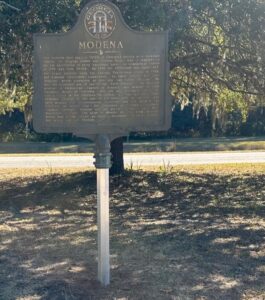Year Erected: 1987
Marker Text: This location first appears (1734) in Georgia's history as a Savannah outpost. An original settler was Thomas Mouse who is remembered for his description of early hardships here. An evangelical visitor in 1736 was John Wesley. By 1740 the settlement was abandoned. The Island revived when the Georgia Trusteeship ended in 1753, and Colonial Government established. An early grantee was John Milledge, whose plantation at this site was called "Modena." He was the orphaned son of one of the "First Hundred," the youthful protégé of Oglethorpe, Captain of Rangers, and member of First Commons House of Assembly. His son and successor, John, Jr., was a leader in the American Revolution. He was appointed State Attorney General at the age of 23 when still in uniform, and later became U.S. Representative, Governor, and U.S. Senator. As Governor he helped found the University of Georgia (Originally Franklin College). Modena was an active plantation until Mid-Nineteenth Century. The name is thought to come from Modena, Italian seat of silk culture; an industry envisioned for early Georgia, but which did not flourish.
Tips for Finding This Marker: At the Skidaway Institute of Oceanography, Skidaway Island
Learn more about this marker here.
Explore this marker and more through the Georgia Historical Society's interactive database.

